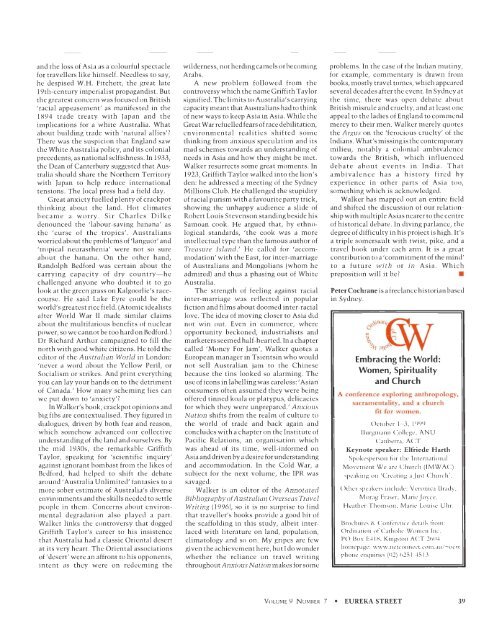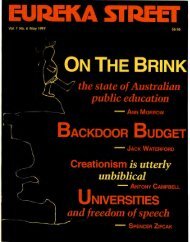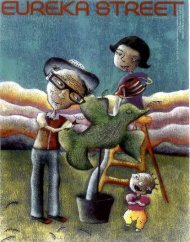1 - Eureka Street
1 - Eureka Street
1 - Eureka Street
- No tags were found...
You also want an ePaper? Increase the reach of your titles
YUMPU automatically turns print PDFs into web optimized ePapers that Google loves.
and the loss of Asia as a colourful spectaclefor travellers like himself. N eedless to say,he despised W.H. Fitchett, the great late19th-century imperialist propagandist. Butthe greatest concern was focused on British'racial appeasem ent' as manifested in the1894 trade treaty with Japan and theimplications for a white Australia. Whatabout building trade with 'natural allies'?There was the suspicion that England sawthe White Australia policy, and its colonialprecedents, as national selfishness. In 1933,the Dean of Canterbury suggested that Australiashould share the Northern Territorywith Japan to h elp reduce internationaltensions. The local press had a fi eld day.Great anxiety fuelled plenty of crackpotthinking about the land. H ot climatesbecam e a worry. Sir Charles Dilkedenounced the 'labour-saving banana' asthe 'curse of the tropics'. Australiansworried about the problem s of 'languor' and'tropical neurasthenia' were not so sureabout the banana. On the other hand,Randolph Bedford was certain about thecarryin g capacity of dry country-h echallenged anyone who doubted it to golook at the green grass on Kalgoorlie's racecourse.H e said Lake Eyre could be theworld's greatest rice field. (Atomic idealistsafter World War II made similar claimsabout the multifarious benefits of nuclearpower, so we cannot be too hard on Bedford.)Dr Richard Arthur campaigned to fill thenorth with good white citizens. He told theeditor of the Australian World in London:'never a word about the Yellow Peril, orSocialism or strikes. And print everythingyou can lay your hands on to the detrimentof Canada.' H ow m any scheming lies canwe put down to 'anxiety'?In Walker's book, crackpot opinions andbig fibs are contextualised. They figured indialogues, driven by both fear and reason,which som ehow advanced our collectiveunderstanding of the land and ourselves. Bythe mid 1930s, the remarkable GriffithT aylor, speaking for 'scientific inquiry'against ignorant bombast from the likes ofBedford, had helped to shift the debatearound ' Australia Unlimited' fantasies to am ore sober estimate of Australia's diverseenvironments and the skills needed to settlepeople in them . Concerns about environmentaldegradation also played a part.Walker links the controversy that doggedGriffith Taylor's career to his insistencethat Australia had a classic Oriental desertat its very heart. The Orien tal associationsof 'desert' were an affront to his opponents,intent as they were on redeeming thewilderness, not herding camels or becomingArabs.A new problem followed from thecontroversy which the name Griffith Taylorsignified. The limits to Australia's carryingcapacity m eant that Australians had to thinkof new ways to keep Asia in Asia. While theGreat War refuelled fears of race debilitation,environmental realities shifted som ethinking from anxious speculation and itsmad schem es towards an understanding ofneeds in Asia and how they might be m et.Walker resurrects som e great moments. In1923, Griffith T aylor walked into the lion'sden: h e addressed a m eeting of the SydneyMillions Club. He challenged the stupidityof racial purism with a favourite party trick,showing the unhappy audience a slide ofRobert Louis Stevenson standing beside hisSamoan cook. He argued that, by ethnologicalstandards, 'the cook was a moreintellectual type than the famous author ofTreasure Island.' He called for 'accommodation'with the East, for inter-marriageof Australians and Mongolians (whom headmired) and thus a phasing out of WhiteAustralia.The strength of feeling against racialinter-marriage was r efl ected in popularfiction and films about doomed inter-raciallove. The idea of moving closer to Asia didnot win out. Even in commerce, whereopportunity beckoned, industrialists andm arketers seemed half-hearted. In a chaptercalled 'Money For Jam', Walker quotes aEuropean manager in Tsien tsin who wouldnot sell Australian jam to the Chinesebecause the tins looked so alarming. Theu se of icons in labelling was careless:' Asianconsumers often assum ed they were beingoffered tinned koala or platypus, delicaciesfor which they were unprepared.' AnxiousNation shifts from the realm of culture tothe world of trade and back again andconcludes with a chapter on the Institute ofPacific Relations, an organisation whichwas ahead of its time, well-informed onAsia and driven by a desire for understandingand accommodation. In the Cold War, asubject for the next volume, the IPR wassavaged.Walker is an editor of the AnnotatedBibliography of Australian Overseas TravelWriting (1996), so it is no surprise to findthat traveller's books provide a good bit ofthe scaffolding in this study, albeit interlacedwith literature on land, population,climatology and so on. My gripes are fewgiven the achievement here, but I do wonderwhether the reliance on travel writingthroughout Anxious Nation makes for som eproblems. In the case of the Indian mutiny,for example, commentary is drawn frombooks, mostly travel tom es, which appearedseveral decades after the event. In Sydney atthe time, there was open debate aboutBritish misrule and cruelty, and at least oneappeal to the ladies of England to comm endm ercy to their m en. Walker m erely quotesthe Argus on the 'ferociou s cruelty' of theIndians. What's missing is the contemporarymilieu, notably a colonial ambivalencetowards the British, which influencedd eb a t e ab out events in India . Thatambivalence h as a his tory fire d byexperience in other parts of Asia too,something which is acknowledged.Walker has mapped out an entire fieldand shifted the discussion of our relationshipwith multiple Asias nearer to the centreof historical debate. In diving parlance, thedegree of difficulty in his project is high. It'a triple som ersault with twist, pike, and atravel book under each arm. It is a greatcontribution to a 'commitment of the mind'to a future with or in Asia. Whichpreposition will it be?•Peter Cochrane is a freelance historian basedin Sydney.("l.1W/1-j :J ~\0Embracing the World:Women, Spiritualityand ChurchA conference exploring anthropology,sacratnentality, and a churchfit for women.O ctober 1-3, 199913urgmann Coll ege, ANUCanberra, AC TKeynote speaker: Elfriede HarthSpokesperson for the InternationalMovem ent W e are C hurch (IM WAC)spea king on 'Crea ting a Just C hurch'.Other spea kers in clude: Veronica Brady,M orag Fraser, Mari e Joyce,H ea th er Tho mso n, M ari e Louise Uhr.Brochures & Conference details from:Ordination of Catholic Women Inc.PO 13ox E41 8, Kin gsto n ACT 26 (J.thomepage: www. netconn ect. com. au I -ocwphone enquiries (02) 6251 45 13V o LUME 9 N uMBER 7 • EUREKA STREET 39
















